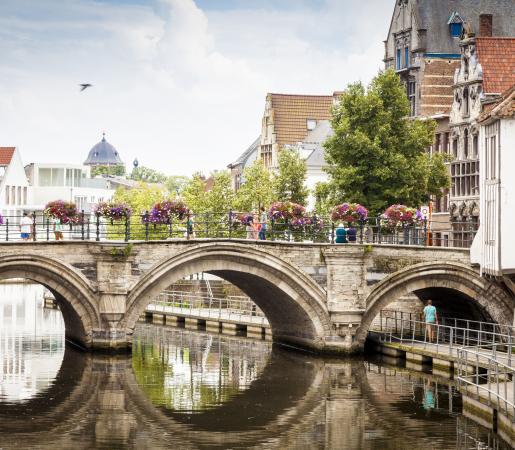
Mechelen
WATSUPS - Water As The Source of Urban Public Space
About the project
The river Dyle is a green-blue axis that crosses the inner city of Mechelen. Over recent years, the riverside saw many improvements: walking and cycling paths; renovation of the quay walls; boat trips and other new recreational activities; cosy riverside restaurants and cafes; and a hotel on the site of the old city swimming pool.
But Mechelen’s population is growing, putting increasing pressure on its already dense urban space. With buildings and paving covering an increasing proportion of land, debates rage over the use of every square metre of remaining open space, whether it is for streets, car or bicycle parking, commerce, cafes, or playgrounds. In addition, past urban development projects and industrialisation have left water quality degraded and aquatic life greatly reduced.
Adding to this, climate change is also increasing heat stress and flooding risks, intensifying the need for softening, cooling and strengthening biodiversity.
This project aims to develop water as a common public space, counterbalancing the gentrification that transformation projects often risk causing. WATSUPS is showing how water in cities can become a common space, and how urban design can involve all citizens as well as the perspective of nature.
Challenges
As the population grows, calls for more open space are intensifying in the densely built-up city of Mechelen. Areas with water that could provide space and beauty are often used for tourism, trade, and private housing developments, excluding access for many citizens and damaging biodiversity. The challenge of this project is to find better balance in designing the public domain around the water, while anticipating the effects of climate change – all in a rapidly changing, complex urban context.
-
Counteracting gentrification and strengthening social cohesion.
Many stakeholders are interested in claiming water to boost the profits of their own projects. WATSUPS, however, aims to develop water as a common public space, open to all. -
Raising awareness of nature’s importance in the city.
Urban biodiversity is under severe pressure, yet it is indispensable for our food and quality of life. WATSUPS promotes urban nature restoration by helping people understand its function and value. -
Increasing water quality using nature-based solutions.
Mechelen’s water is highly polluted. Good water quality is indispensable to enhance aquatic life and enable swimming in open water. -
Anticipating climate change.
Due to ground paving and climate change, when temperatures rise, Mechelen becomes a heat island, and is vulnerable to flooding. The area needs nature-friendly bank restoration, softer and green spaces, and city cooling. -
Enabling open water swimming, a groundbreaking move.
In Belgium, swimming in open water is totally forbidden. Mechelen aims to set an inspiring example for all other cities, with necessary measures in the context of prevention and safety in and around water, and opening up data.
Proposed solutions
Local involvement is at the heart of the WATSUPS project. It brings insights, understanding, engagement and supported solutions for a balanced interpretation of the public land next to the water, and the river itself. Participation starts with a citizen panel. The panel's advice is incorporated into the co-creation processes where residents, relevant stakeholders and experts are involved in the redesign of a series of riverside public spaces in the city.
-
By listening to experts and working with AR-VR technology, WATSUPS gives a voice to nature and can visualise the importance and impact of potential redevelopment measures.
-
To improve water quality and safety for natural organisms, nature-based solutions include technology on river locks to prevent blue-green algae, natural soft riverbanks, and green-blue stepstones for more biodiversity.
-
When redeveloping the riverbanks and public land, WATSUPS opts for softening, greening with native plants, creating bee hotels and nesting opportunities for birds, dimming streetlights, and creating cooler riverside places in the city centre.
-
Making safe open water swimming possible thanks to legislative amendment, promotion of water quality, and access to digital data access on water quality.
Milestones
Advice provided by the citizens' panel is ready to be integrated into all areas of the project
The inventory of existing plants and animals is a basis for biodiversity restoration and monitoring
VR/AR technology enables visualisation of current and future fauna and flora during the co-creation process
The art installation raises awareness of life in and around water.
New zones for open water swimming and other blue recreation are ready for public use
The riverside public spaces have been co-designed to benefit people and promote biodiversity.